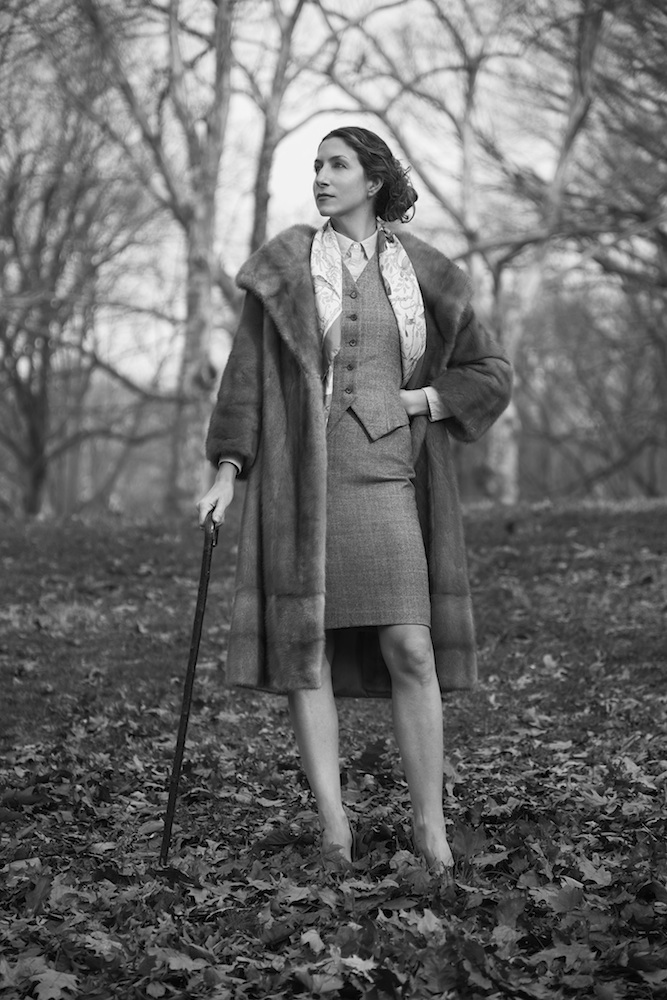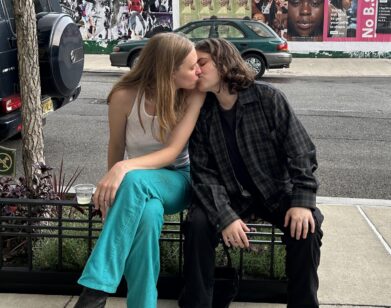The Misadventures of Iris Smyles

ABOVE: IRIS SMYLES. PHOTO COURTESY OF CHRIS STEIN.
Iris Smyles’s Dating Tips for the Unemployed (Houghton Mifflin Harcourt) is the author’s second novel starring her fictional alter ego, Iris. In engaging episodes, Iris-the-character neurotically navigates dating in New York City, smokes pot on Greek islands with hapless lovers, drinks too much, deals with disapproving family, and eats a lot of cannoli. Smyles’s surreal, lyrical voice elevates these every day scenarios into the realm of the fantastic and absurd.
Included in the book are hilariously stylized advertisements full of false promises, such as “Health Secrets of the Roman Empire” and “Have Your Portrait Painted By An Elephant!” all for a price.
Smyles is sharp, melancholy, and wickedly funny. She is unafraid to reveal and revel in her character’s flaws because it is what makes them so achingly, relatably human.
We met Smyles for lunch at Monkey Bar after her champagne and breakfast black tie book party in the lobby of the Times Square Econo-Lodge. We spoke about the importance of misadventures, romance, porcupines, The Odyssey, and the myths we all make up about our own lives.
ROYAL YOUNG: Let’s talk about the importance of misadventures. I feel like making mistakes is interesting and fun.
IRIS SMYLES: I’ve called them adventures and misadventures. I’m trying to figure out what the difference is exactly. Is an adventure more fruitful than a misadventure?
YOUNG: No, I think a misadventure is.
SMYLES: Yeah. There’s something that comes from mistakes. Maybe adventures involve treasure or something. I think the wrong turns are more important than the right ones. Most people don’t go through life without making mistakes, but sometimes you meet someone who seems to hit all the marks. But they never seem to know very much. They have success and luck but no real wisdom. Both of my books are about discovering those things and redeeming those experiences.
YOUNG: How do you think we redeem our mistakes? By writing about them?
SMYLES: Yes and by looking back and evoking the naivety that one had at the time, but arranging it with the wisdom of the author. I work very hard not to comment as the author on the narrator, Iris, and her experiences. I let her be blind and wander through. If you take the character at face value she often says very naïve or wrong things.
YOUNG: You comment a lot on romance in New York City and how fraught that is. Being in love and being alone.
SMYLES: I feel like they go hand in hand uniquely in New York City. Love can be a very lonely experience here. One thing I feel about the city is we’re all in one giant room. On the street, it’s like you’re all at a party. It creates this intimacy with strangers, which is one of the things I love about it. It’s the greatest place to be lonely. I think I was born lonely and that won’t be fixed. I’ve finally figured that out. Schopenhauer compares humans to porcupines, because he says they’re constantly going towards each other for warmth, but when they get close they prick each other and it hurts and they run away. Then they get cold again so they go back. In New York City we’re definitely porcupines.
YOUNG: Why is family such a big part of your material?
SMYLES: My mother is from Greece and my father’s father is from Greece and they’re very traditional. I didn’t realize it growing up, until they sunk their teeth into me and let me know there were expectations, like getting married. I feel torn between being a dutiful daughter and also writing. As a Greek woman, the most important thing you can do in life is get married and have children. You could win the Nobel Prize, but if you don’t have a husband and kids everyone feels bad for you because you’re a failure. My allegiance isn’t to myself, but it is to my writing and being honest. I’m just starting to find myself as an artist. Forgive the expression.
YOUNG: Forgiven.
SMYLES: For a long time I was lost. My life got a lot better when I stopped thinking about my life and started thinking about my work and the purpose of that work.
YOUNG: Do you think being lost was a critical part of you getting here?
SMYLES: Absolutely. This book takes as its model The Odyssey. Odysseus was lost. He went away and didn’t find his way home again for 20 years. Are those all mistakes? Would the book be better if he had just gone straight home? He is who he is from all his experiences. He changes. He finds himself. That’s what my book is about too. There are episodes, love affairs, and partying— trying to get to the next point in your life. We all do it. I believe our lives are important when we learn something and love. I really want to capture the meaning of experience.
YOUNG: Why do the ads come in?
SMYLES: Because a big theme of the book is seduction.
YOUNG: And also being sort of mis-sold on something?
SMYLES: Yes and illusion. And seducing ourselves, our own self-delusions, the things we think we want but we really don’t. Advertising in America is when we are sold our own dreams and desires.
YOUNG: There’s a lot of longing in the book. For a quick fix, for love, a feeling that something is missing.
SMYLES: Exactly. This book is about the pitfalls of adulthood. The shortcut is an illusion. You have to go through.
YOUNG: I think we live in a country where self-mythology or making up legends about your own life is something everyone does.
SMYLES: Certainly and it’s frightening. The publication process takes me away from doing and talking about what I’ve done. It’s a slippery slope talking about yourself. One of the things I write about are Iris’s struggles with alcoholism. I feel very frightened announcing to anyone anything I’ve figured out because it’s so tenuous. You have to keep relearning the same lessons.
YOUNG: It’s so much healthier to acknowledge we’re fluid and constantly in flux than to pretend to live in a universe where everything is fixed.
SMYLES: Also, with this idea of self-mythology, perhaps that’s why I’ve developed a few alter egos. There’s me, the character on the page, and then the author persona, which is an alternate version of me. I feel much more comfortable with that—creating myself as a fiction. I’m very private. There’s so much I don’t share. It’s like a decoy. If you’re ever sleeping in a room with mosquitos a good thing to do is go under the covers but then stick one foot out so you only sacrifice the foot. That’s kind of what I do. I put my foot out.
DATING TIPS FOR THE UNEMPLOYED IS OUT NOW.






